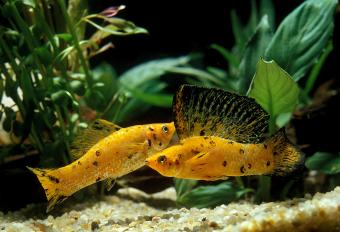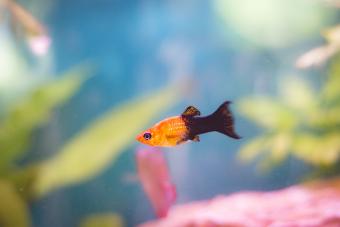
There are five diseases that strike Oscar fish frequently and are easy to recognize, including hole in the head disease, ich, fin and tail rot, popeye disease, and bloat. Learn how to spot a sick Oscar fish and determine which treatment it needs.
1. Hole in the Head (HITH) Oscar Disease

The exact cause for HITH has not been determined. However, one possible culprit is the flagellate parasite Hexamita. Other factors may play a role in the development of this illness, including vitamin or mineral imbalances, overcrowding, poor water quality, or improper nutrition.
Symptoms of HITH in Oscars
Some symptoms of HITH include:
- White sores around the eyes and on top of the head
- Pitting lesions of the head and lateral line
- Larger holes and sores
- Mucous trailing from the holes
- Loss of appetite
Treating Oscars With HITH
This disease is fatal if left untreated. According to a case report in the Iranian Journal of Veterinary Science and Technology, this condition can be treated with a drug called Flagyl (metronidazole). This was added to the aquarium water, and the fish was left in this bath for about 24 hours. In the case report, the fish also received treatment with malachite green and formalin (also as a bath), but it is uncertain whether these steps are necessary.
Dr. Margaret A. Wissman, DVM, DABVP notes that metronidazole can be administered in a medicated fish food flake if your fish is still willing to eat. Treatment takes five to 10 days. Alternatively, for fish who are not willing to eat, she recommends a bath in metronidazole for six to 12 hours.
There are no controlled studies of treatment methods for HITH disease. Since the disease may be partially caused by environmental factors, it is important to focus on correcting any of these husbandry issues as well.
2. Ich (White Spot Disease)

Ich is a very common disease problem for all aquarium fish, including Oscars. It is caused by Ichthyophthirius multifiliis, a protozoan parasite. According to veterinarian Dr. Jessie Sanders, the organism causing ich has a complex life cycle and can reproduce rapidly, leading to a sudden onset of disease. The development of the parasite occurs more quickly in warmer water, and fish who have weakened immune systems due to stress or disease are more susceptible. It is most commonly brought into an aquarium by the addition of new fish, live plants, or live food items.
Symptoms of Ich in Oscars
Some symptoms of ich include:
- Loss of appetite
- Reddening of the fins
- White spots on the skin or gills
- Sitting on the bottom of the tank
- Flashing, a behavior in which fish rub their bodies on objects in the tank
- Increased gill movements
Treating Oscars With Ich
Ich is usually fatal if not promptly treated. Dr. Margaret A. Wissman, DVM, DABVP suggests that several treatment options are available, with a variety of protocols and dosing regimens. The following products can be used under the guidance of a professional:
- Salt (non-iodized table salt, Kosher salt, sea salt, or aquarium salt)
- Formaldehyde (formalin)
- Malachite green
- Victoria green and acriflavin
- Copper sulfate
It can be helpful to increase the water temperature while you are treating your Oscar fish. The higher temperature will speed up the life cycle of the ich parasite and will decrease the time required for treatment. However, never exceed the recommended temperature range for Oscars, which is between 75 and 80 degrees Fahrenheit.
Some medications used to treat ich are toxic to invertebrates or to live plants. Read the label directions carefully or consult with your veterinarian about specific doses, or any special considerations for your aquarium. Some fish with ich will also suffer from secondary bacterial infections and may need an antibiotic.
3. Fin and Tail Rot (Columnaris Disease)

Fin and tail rot is caused by a bacterial infection. There are mixed reports of which bacterial species causes this disease. Some possible bacteria include Flavobacterium columnarae, Cytophaga spp., Aeromonas spp., Pseudomonas spp., or Flexibacter spp. Like HITH, this disease is more common when fish are stressed by poor environmental factors such as overcrowding, low oxygen levels, or poor water quality. The infection can also occur in tissue that is first damaged by wounds or abrasions.
Symptoms of Fin and Tail Rot in Oscars
According to NippyFish.net, some symptoms of fin and tail rot include:
- Tattered, bloody, or blackened fins
- Portions of the fin may fall off
- Listlessness or lethargy
- Spending more time at the surface
- Loss of appetite
- A slimy or milky appearance to the fins or body
Treating Oscars With Fin and Tail Rot
Treatment of fin and tail rot will usually require antibiotics. According to Dr. Erik Johnson, fish that are severely affected may require surgery to remove the worst of the infected tissue. There is some chance that the fins will regrow, usually with minor cases of fin and tail rot. Make sure to test for and correct any stressful factors that have contributed to your fish's illness.
According to FishTankTutor.com, some antibiotics available over-the-counter that can be used for this disease include:
- Chloramphenicol
- Tetracycline
- Oxytetracycline
Perform a 20 to 30 percent water change prior to treatment. It is also helpful to add aquarium salt to the water according to the package directions. This problem can be prevented by providing fish with adequate space and hiding places such as rocks and plants, confirming the tank is not overcrowded, and by testing your tank's water to ensure that it is healthy for your fish.
4. Popeye Disease

Popeye disease is a description of a symptom that is difficult to confuse with any other problem in your pet Oscar. Popeye disease, sometimes referred to as exophthalmia, is caused by chronically poor water conditions, and is most commonly characterized by painful bulging of the eyes.
Symptoms of Popeye Disease
The symptoms of popeye disease include:
- A swollen or bulging eye
- A cloudy appearance to the eye
- One or both eyes can be affected
Treating Oscars With Popeye Disease
This problem has three components, which all need to be addressed when treating popeye disease:
- Damage to the cornea (the clear outer surface of the eye)
- Fluid build-up behind the eyeball
- Secondary bacterial infection
Treatment of popeye disease can be difficult. According to Aquarium Source, the following steps are needed:
- Correct any water quality issues and perform a water change
- If you suspect that your fish was injured by another fish, separate it
- Use an antibiotic product (available over-the-counter) and follow the label directions
- Optionally, add aquarium salt made for use in freshwater systems at a rate of 1 tablespoon per 5 gallons of water
Even if the treatment is successful in saving the fish, some Oscars will lose the affected eye if the damage was too severe. Most fish can adapt to being blind in one eye, but if your pet is blind in both eyes, you will have to pay close attention to make sure that your fish is feeding adequately.
5. Bloat or Dropsy

Bloat is a serious condition in Oscar fish and can be caused by a variety of underlying problems. It is more of a symptom of disease rather than a single disease by itself. One underlying cause of bloat that is particularly common in Oscars is overfeeding, which can lead to constipation.
Symptoms of Bloat or Dropsy
According to aquarium enthusiast Melody McKinnon, you can see several symptoms when a fish is constipated:
- Erratic and uncontrolled swimming
- Lack of bowel movements
- Hard feces trailing from the fish
- A bloated appearance
Treating Oscars With Bloat
Constipation can be treated by withholding food, performing a water change, and increasing the water temperature by one to two degrees. Feed small pieces of peeled, softened, slightly cooked or canned peas. If your fish does not improve, your fish may have dropsy, which is much more serious. According to OscarFishLover.com, symptoms of dropsy can include:
- A soft or firm swelling in the abdomen
- A bloated appearance
- A raised appearance to the scales
- Popeye disease
- Loss of appetite
- Irregular or erratic swimming
These symptoms can occur with a variety of medical problems, including organ damage, tumors, severe constipation, or an intestinal blockage. At-home treatment of dropsy is often unsuccessful, and many fish with these symptoms will die. Consult with your local veterinarian to see if anything can be done for your fish.
Disease Prevention Tips for Oscars
There's a common theme when preventing most of these Oscar fish diseases: keeping the aquarium water clean. You can follow these steps to help ensure a healthy aquarium:
- Test the tank water frequently and make sure levels of ammonia and nitrates are within acceptable limits.
- Install a thermometer in your tank and keep water temperatures at optimal levels.
- Quarantine new fish for at least two weeks (ideally four to six weeks) to make sure they aren't sick or carrying parasites. New fish can introduce diseases into even the cleanest aquarium environments.
- Change filter pads and materials frequently following manufacturer's directions.
- Always provide adequate tank space for your Oscar fish and do not overcrowd fish.
- Buy new fish from pet stores with healthy fish. Never buy fish from a tank with cloudy, dirty water or visibly sick fish, even if the fish you want to buy looks healthy.
- Treat your fish as soon as they get sick, and separate sick fish from healthy ones by placing them in a separate tank if possible.
Happy and Healthy Oscar Fish
Oscars are friendly and interesting fish. With careful attention to their water and food needs, you can prevent most of these diseases. If your Oscar ever does become sick, quick recognition of the common signs of these ailments can help you implement treatment promptly and get your fish on the mend.







